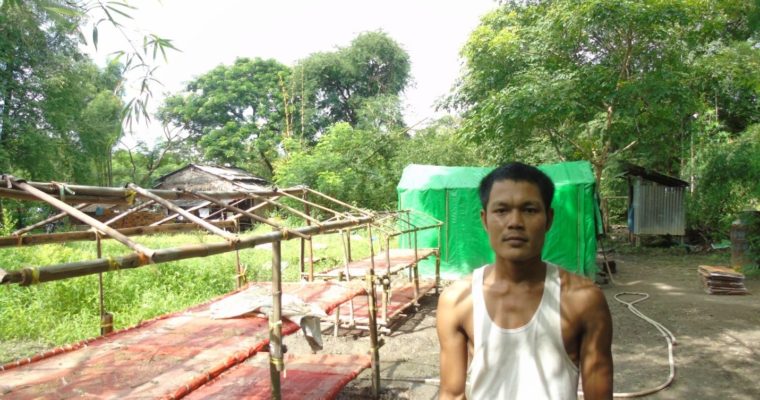Yangon, Myanmar – Ko Phyo lives in Bagan Taung village, Thanlyin, Yangon Region, Myanmar. In 2015, he attended a two-week farmer empowerment training conducted by the AFFM (Agriculture and Farmer Federation of Myanmar) where he learned natural resources management, organic agriculture, compost-making, and mushroom-growing.
“I don’t have any training or resources that I can use in developing my farm for more income,” Phyo shares. “From the training, I learned a lot of techniques on farming, mushroom-growing, compost-making, and soil maintenance. The training also gave me the idea of how we can manage the natural resources around us.”
Phyo started growing straw mushrooms. This type of mushroom has a good market in the country. Currently, one kilogram of straw mushrooms sells for 3,000 Myanmar kyats (USD 2). He makes MMK 160,000 (USD 110) from each of the six mushroom beds he made.
Phyo shared that from his mushroom business, he earns enough money for his family’s daily expenses. “I can make enough income from mushroom growing more than the amount I will get if I work at a factory. I also have more time to do other work. I don’t need to spend all of my time on mushroom-growing alone,” he says.
He plans to expand his mushroom farm and grow two different types of mushrooms. He already started acting on it by collecting materials for the additional mushroom houses.
Moreover, Phyo also started a family garden in his small compound where he will grow different kinds of organic vegetables. Before, he considered local resources in his compound such as straw, water hyacinth, dried leaves, grass, and farm residues as wastes and he used to just burn these. After the training, he learned ideas on how to manage local resources to achieve zero waste farming. He realized that the local materials available around his house and the residues from mushroom-growing can be utilized as fertilizer for his vegetable garden.
“Growing our own food makes my family and the environment healthy. I will save money because I will no longer buy vegetables from the market. I can even sell vegetables to the local people at affordable prices,” he says. #
About MTCP2
The Medium-Term Cooperation Program Phase 2 (MTCP2), a five-year capacity building program supported by the International Fund for Agricultural Development (IFAD), the Swiss Agency for Development and Cooperation (SDC), and the European Union (EU) , has been implemented in 22 countries across three sub-regions—Southeast Asia (through the ASEAN Farmer Organization Support Program-AFOSP-MTCP2), South Asia, and the Pacific—engaging 86 national federations of farmers organizations with 1,628 sub-national farmers organizations (FOs) with a total membership of around 43.5 million small-scale women, men and young farmers. The funding support (12 million USD) served as a catalytic fund that allowed FOs to enhance their capacity to engage in policy dialogues and to be effective channels of economic services to farmers. The program has contributed to the formation of strong national platform of FOs with improved capacity to engage in constructive policy processes and mobilize resources from mainstream agricultural development programs like extension services, credit, and pre and post-harvest facilities. The program also helped in re-structuring farmers’ associations into community-based social enterprises or as commodity-based cooperatives as well as consolidating FOs into agricultural cooperative federations/union to strengthen the role of small-scale farmers within an inclusive and sustainable value-chain. The program is being implemented by the consortium Asian Farmers’ Association for Sustainable Rural Development (AFA) and La Via Campesina (LVC).




Comments are closed